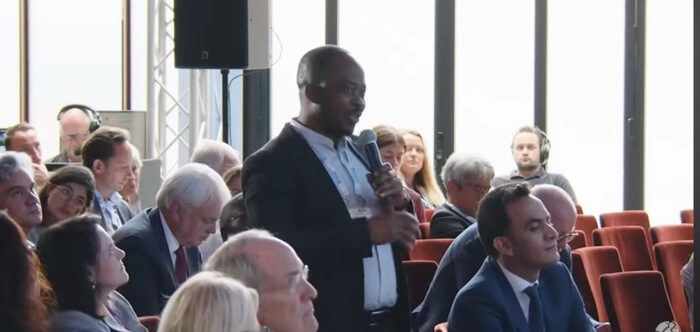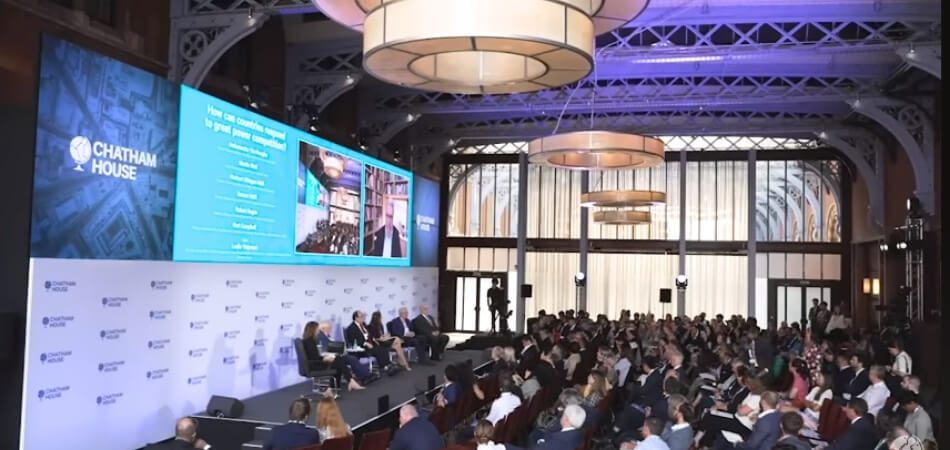The process of organizing a conference can be a challenge, requiring careful planning and attention to detail. From selecting the right speakers to ensuring a seamless flow of events, every aspect plays a crucial role in the conference’s success. This often leads to the question, What Should Be Included in a Conference?
A successful conference should include a strong opening keynote, diverse speaker presentations, interactive workshops, structured networking opportunities, and insightful panels. Each element is designed to provide attendees with a meaningful experience, offering opportunities to learn, connect, and grow. These components are essential for creating an impactful event that engages all attendees with all participants.
Are you curious about how to structure a conference for maximum impact? In this article, you’ll find every necessary detail to ensure your conference is both successful and memorable. Keep reading to explore the key elements that should be included in any well-organized event.
A Brief Overview of the Purpose of a Conference
The value of conferences continues to grow in the age of virtual communication. They offer platforms where intellectual discourse, networking, and skill development come together in a way that virtual interactions cannot match. Understanding their core purpose is essential for making the most of these events and maximizing the benefits they offer.
A conference aims to facilitate the exchange of ideas and knowledge between participants. This is typically achieved through various formats like keynotes, workshops, and hands-on sessions. These settings allow attendees to deeply explore specific topics, improving their educational experience and providing knowledge that is hard to gain elsewhere.
Networking remains a fundamental aspect of any conference. In countries like Canada, professionals gather to connect, share ideas, and explore potential collaborations. Often, the agenda is structured around the key components of a conference, ensuring plenty of opportunities for relationship-building, from formal dinners to specialized networking events. Attending conferences in Canada can be an excellent way to expand your network and discover new opportunities.
Well-organized conferences often provide inspiration and motivation. A powerful motivational speaker or an engaging closing panel can leave attendees feeling reinvigorated and eager to apply the new insights they’ve gained. These emotional boosts can be just as valuable as any skills or connections made during the event.
Types of Popular Conference
Different types of conferences cater to different professional and academic needs. These events provide opportunities for networking, learning, and collaboration, making them essential for personal and organizational growth. Explore the types below for more insights.
Industry Conferences
These are large-scale events that focus on a specific industry, such as technology, healthcare, or finance. Industry leaders and professionals gather to discuss trends, innovations, and challenges within the sector, offering networking and learning opportunities.
Academic Conferences
A variety of academic fields are presented and discussed during these conferences. They often include paper presentations, poster sessions, and keynote speeches, promoting collaboration and the exchange of knowledge.
Business Conferences
Professionals attend business conferences to share best practices, learn new strategies, and explore trends in marketing, management, and entrepreneurship. These events often feature workshops, panel discussions, and networking sessions.
Micro Conferences
An event that caters to a niche topic or a specific interest is known as a micro conference. With fewer attendees, they offer a more personalized experience. Understanding micro conferences can help you tap into highly specialized knowledge and networking opportunities.
Professional Development Conferences
Focusing on career growth and skill enhancement, these conferences offer workshops, seminars, and training sessions. They are ideal for individuals looking to advance in their careers or gain new certifications in their field.
Social Impact Conferences
In these conferences, social issues such as sustainability, human rights, and community development are discussed. They bring together activists, policymakers, and organizations to discuss solutions and collaborate on projects that drive positive change.
Your professional career can be significantly enhanced by attending different types of conferences. Each offers unique opportunities for growth, networking, and learning. Choose the right conference to align with your goals and maximize your experience.
What Should Be Included in a Conference?
Organizing a conference requires careful planning and attention to detail to create a meaningful and impactful experience for attendees. The main elements that should be included in a conference are:
Keynote for the Opening Theme-setting
The opening keynote serves a vital role in setting the overall tone and theme of the conference. By choosing a renowned speaker in the field, you not only draw a larger audience but also offer a formative experience that will shape the conversations and interactions that follow. This keynote should be both informative and inspirational, providing attendees with a solid foundation for the event.
Diverse Speaker Presentations
A conference’s core is its speaker presentations. There should be a variety of topics related to the theme and varying levels of experience so that attendees with varying levels of expertise can participate. Speakers with diverse perspectives, experiences, and backgrounds can enrich the learning process. It’s often helpful to mix different formats like lectures, debates, and interviews to keep the audience engaged.
Interactive Hands-On Sessions and Skill-Building Workshops
Beyond traditional presentations, interactive sessions and workshops offer attendees hands-on experience and skill-building. The purpose of conference workshops is to provide practical knowledge that participants can apply in their everyday work. Whether it’s coding, public speaking, or scientific labs, these workshops offer practical, actionable insights beyond the usual theory.
Structured Networking Opportunities
One of the most valuable aspects of attending a conference is networking. Plan structured networking sessions, round-table discussions, or even more casual social events like dinners or cocktail hours where attendees can meet and exchange ideas. Creating the right environment for networking can lead to fruitful professional relationships, collaborations, and even future business opportunities.
Team-Building Activities for Community and Cohesion
Include team-building exercises or activities that encourage participants to work together less formally. This can range from problem-solving challenges to creative collaborative efforts. These activities provide a break from the more structured agenda and help build community among attendees.
Insightful Panels and Interactive Q&A Sessions
Taking part in a panel discussion provides multiple perspectives on a topic, and it can foster a more dynamic interaction between the speaker and the audience. Meanwhile, Q&A sessions allow attendees to delve deeper into specific subjects and engage directly with experts. These settings often result in lively discussions and are some of the most memorable parts of a conference.
A Motivational Ending to Inspire and Encourage Action
Make a lasting impression with a motivational speaker. The goal is to inspire attendees to put what they’ve learned into practice. The final touch can make the difference between an informative conference and one that transforms. You can create a conference that is not just a gathering of people, but a compelling experience that provides value, inspiration, and opportunities for everyone.
When a conference is well-structured and offers attendees valuable experiences, knowledge, and connections, it can leave a lasting impression. By carefully planning each element, you create an environment that inspires action and fosters meaningful professional growth.
Essential Tips for Successful Conference Planning
The key to an effective conference is planning carefully, paying attention to details, and executing it effectively. Here are the key steps to ensure your conference runs smoothly:
- Define Clear Objectives: Start by identifying the purpose of the conference. Determine what you want to achieve, whether it’s networking, education, or launching a product. Clear objectives will guide your planning process.
- Set a Budget: Establish a realistic budget that covers all aspects of the conference, including venue, speakers, marketing, and logistics. Keep track of expenses and adjust as needed to avoid overspending.
- Choose the Right Venue: Select a venue that suits the size and style of your event. Consider location, facilities, and the environment. Ensure the venue can hold the expected number of attendees comfortably.
- Develop a Detailed Agenda: Create a well-structured agenda that includes keynote speakers, breakout sessions, and networking opportunities. Make sure the content is relevant and engaging to your target audience.
- Promote the Event: Use various marketing channels such as social media, email campaigns, and partnerships to promote your conference. Early promotion helps to build interest and secure registrations.
- Plan for Logistics and Technology: Organize all logistical aspects, from registration to refreshments. Ensure you have the necessary technology in place for presentations, live streaming, and attendee engagement.
- Engage Attendees: Create opportunities for attendees to interact, network, and participate actively. Use apps or social media to keep them engaged before, during, and after the event.
- Prepare for the Unexpected: Have backup plans in place for potential issues such as speaker cancellations or technical difficulties. Being prepared helps to mitigate disruptions.
- Review and Follow-Up: After the conference, gather feedback from attendees, speakers, and sponsors. Use this information to evaluate the event’s success and identify areas for improvement for future conferences.
Careful planning and attention to detail are key to a successful conference. By focusing on these steps, you can create a seamless and impactful event that connects with attendees.
Frequently Asked Questions
The planning of a successful conference requires attention to several factors that ensure attendees will have an enjoyable experience. Below are some frequently asked questions that address additional aspects to consider when organizing a conference, helping you cover all the essential details.
How Important Is Audience Engagement During a Conference?
A successful conference depends on audience engagement. Engaged attendees are more likely to participate actively, absorb information, and form valuable connections. Incorporating interactive elements like Q&A sessions, polls, and live discussions throughout the event can enhance engagement and ensure a positive experience.
What Role Does Branding Play in a Conference?
Branding plays a significant role in creating a cohesive and memorable conference experience. By using strong branding across materials such as posters, programs, and digital platforms, the conference’s theme and purpose will be reinforced. It also helps in establishing the event’s identity, making it recognizable and setting the tone for the attendee experience.
Why is Pre-Conference Communication Essential?
It is important to communicate with attendees before the conference to set expectations and prepare them for the event. Regular updates through emails, social media, or an event app keep participants informed about the agenda, speakers, and logistical details. This communication helps build anticipation and ensures attendees are well-prepared.
How Can Post-Conference Surveys Improve Future Events?
Attendee feedback provided by post-conference surveys helps organizers understand what went well and what needs improvement. The information gathered from these surveys can be used to refine future conferences, ensuring that each event is better tailored to meet the needs and expectations of participants.
What Should Be Included in a Conference Welcome Package?
A well-prepared welcome package adds a personal touch to the conference experience. It should include essentials like an agenda, speaker bios, venue maps, and any relevant materials for sessions. Including branded items like pens, notepads, or tote bags can improve the attendee experience and serve as a lasting reminder of the event.
Bottom Lines
An effective conference requires strategic planning, attention to detail, and thoughtful execution. It is possible to create an event that meets all participants’ expectations by carefully selecting the right speakers, creating an agenda, and ensuring smooth logistics. Your preparations will greatly improve your experience.
When considering What should be included in a conference? It’s essential to incorporate key elements like a strong opening keynote, diverse presentations, interactive workshops, and ample networking opportunities. Together, these components create a well-rounded conference that educates, inspires, and fosters valuable connections among attendees.
Keep your conference focused on your objectives, be ready for the unexpected, and engage your attendees at every step. By following these tips, you’ll be well on your way to hosting an impactful conference. Good luck!







